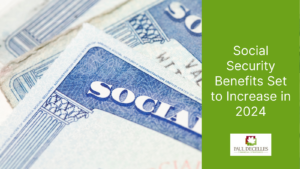Timing Your Earnings in Retirement to Optimize Your Social Security Retirement Benefit

What is this strategy?
If you work after you begin receiving Social Security retirement benefits, all or part of your retirement benefit may be withheld if your earnings exceed the retirement earnings test exempt amount. However, excess earnings won’t affect your benefit once you reach full retirement age, and it’s possible to time your earnings in retirement in order to optimize your benefit before full retirement age.
If you’re under full retirement age and earn more than the annual retirement earnings test exempt amount by working after you retire, you may be considering timing your earnings in retirement.
Tip: Remember, though, if your monthly benefit is reduced in the short term due to your earnings, you’ll receive a higher monthly benefit later. That’s because the Social Security Administration recalculates your benefit when you reach full retirement age, and omits the months in which your benefit was reduced.
How to do it
Postpone your earnings
The easiest way to avoid having all or part of your Social Security benefit withheld due to excess earnings is to postpone your earnings. You can postpone your earnings in two ways:
The first way is to determine when you actually work and earn income: If you’re working for an employer, your wages are counted as income in the year you earn them. Because earnings at full retirement age or later will never reduce your Social Security retirement benefit, you might postpone working after retirement until you reach full retirement age if you expect to have excess earnings.
The second way is to postpone when you receive your earnings: If you’re self-employed, you can limit the effect of excess earnings on your retirement benefit by postponing when you receive your earnings. This is because earnings from self-employment are treated as earnings in the year they’re received.
Bunch your earnings
If you believe that all of your retirement benefit in one year will be withheld due to excess earnings, you may be able to bunch your earnings for that year in order to avoid affecting your benefits the following year.
Caution: Bunching your earnings from self-employment may help you avoid having your Social Security benefit withheld, but you should consider the overall tax implications. For example, if your earnings in one year are high enough, you may be subject to the additional Medicare payroll tax and the Medicare investment income surtax, or even be pushed into a higher income tax bracket, among other things. Consult a tax professional for help with your individual tax situation.
Time the start of benefits
Special rules apply to excess earnings during the first year of retirement. You might benefit from electing to begin receiving retirement benefits during a year in which you expect your earnings to be particularly high. During the first year you receive retirement benefits, if your wages from an employer are more than the annual retirement earnings test exempt amount, your retirement benefit will be reduced by the lesser of: (1) the reduction in benefits that would occur if the annual test applied, or (2) the benefit you received in the month or months that you earned more than 1/12th of the annual retirement earnings test exempt amount.
Example(s): Consider the following case: Jeff retires on September 30 at age 62. Before he retires, he earns $80,000 during the year. In October, he begins working part-time and earns $1,000 per month for the last three months of the year. Even though his earnings for the year greatly exceeded the annual retirement earnings test exempt amount for that year, Jeff still receives a full Social Security benefit for October, November, and December. This is because his earnings in those months did not exceed 1/12 of the annual earnings test exempt amount for that year. However, beginning the following year, the annual retirement earnings test amount will apply to him because he will be beyond his first year of retirement.
Caution: This monthly test for excess earnings only applies if your wages are from an employer. If you are self-employed, the excess earnings test applies in a different manner.
Strengths
You can avoid having part or all of your Social Security retirement benefit withheld
By postponing or bunching your earnings in retirement, you may be able to avoid earning more than the retirement earnings test exempt amount. By timing when you first begin receiving Social Security retirement benefits, you may be able to lessen the impact of earned income on those benefits. But see Tradeoffs.
Tradeoffs
The Social Security retirement benefit you keep may not be enough to offset the earnings from working that you lose
Example(s): Phillip (age 63) receives a Social Security retirement benefit of $1,000, or $12,000 per year. Phillip earns $33,240 in 2023, exceeding the earnings limit of $21,240 by $13,000, so his benefit is reduced by $1 for each $2 over the earnings limit, a total of $6,500 in benefits. Phillip’s income for 2023 is:
Social Security Benefit: $6,500
Employment Earnings: $33,240
Total Income: $39,740
Example(s): If Phillip decided to limit his earnings from his job to $21,240, his income in 2023 would have been:
Social Security Benefit: $12,000
Employment Earnings: $21,240
Total Income: $33,240
Even though part of Phillip’s Social Security retirement benefit was withheld due to excess earnings, the money he earned from his job more than made up for that reduction.
Questions & Answers
How will earnings during the year you reach full retirement age affect your retirement benefit?
Earnings after full retirement age won’t affect your retirement benefit. But few people reach their full retirement age on January 1. What if you have earnings during the year before you reach full retirement age? The answer is that you are entitled to a special earnings exemption for the months that precede your birthday. For example, if you reach your full retirement age on December 1, you will be entitled to earn up to the earnings test exemption amount for that year during the months that precede your birthday without reducing your benefit, and once you reach your birthday, none of your earnings will reduce your benefit. So, in this example, as long as your earnings from January through November don’t exceed the earnings limit, you will receive all of your retirement benefit. However, if your earnings do exceed that amount $1 of your benefit will be withheld for every $3 of earnings that exceed the limit. In 2023, the retirement earnings test exempt amount is $56,520.
Content in this material is for general information only and not intended to provide specific advice or recommendations for any individual. All performance referenced is historical and is no guarantee of future results. All indices are unmanaged and may not be invested into directly.
The information provided is not intended to be a substitute for specific individualized tax planning or legal advice. We suggest that you consult with a qualified tax or legal professional.
LPL Financial Representatives offer access to Trust Services through The Private Trust Company N.A., an affiliate of LPL Financial.
This article was prepared by Broadridge.
LPL Tracking #1-05352947





